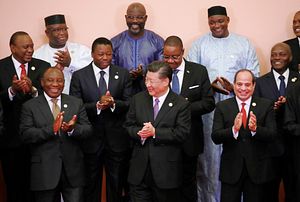As an African living in Beijing, I’m usually in a small minority. But over the past week, the number of African faces in the city has risen dramatically, as African presidents, government officials, and business people flocked to Beijing for a huge summit. The summit is known as the Forum on China Africa Cooperation – FOCAC for short, and is now in its 18th year. Through FOCAC, leaders from Africa and China meet every three years, and it’s the place where China tends to announce how much money will flow to Africa through aid and loans. This year, China’s President Xi Jinping announced $60 billion in various types of aid and loans to the continent. In the margins of the meeting, leaders such as Nigeria’s President Muhammadu Buhari took the opportunity to make new deals to start using the funds.
However, prior to the Summit, my Twitter feed became increasingly polarized, and remains so.
Half the people I follow are saying China is guilty of neocolonialism – trapping Africa into a debt crisis with huge loans. The other half say any criticism of the China Africa relationship is a “Western conspiracy.”
So who is right?
Before I begin, I should point out that most of the people voicing these contrary opinions are not Africans. While I certainly can’t represent all Africans, here is what many of the African ambassadors, officials, and experts I work with daily think of Chinese loans to Africa, in particular.
According to the African Development Bank, Africa needs a whopping $130 to $170 billion worth of new infrastructure annually – from trains to power stations. The continent will also face additional costs due to climate change of $20 to $30 billion per year. But African countries are not large or rich enough to pay for this by themselves – they need external help, and in particular loans.
In theory, there are many places African countries can get loans – the U.K., the World Bank, the African Development Bank (AfDB), and even private banks. So why would they choose loans from China?
First, some of the non-Chinese organizations only give their lowest-interest loans to the very poorest countries – so countries like Kenya, Cote d’Ivoire, and Nigeria that are classified as “middle-income” have to look elsewhere for the lowest repayment rates.
Second, when African countries can get non-Chinese loans, for some projects the average wait is a lengthy nine years. Sometimes, the delays are due to environmental and social scrutiny. But not always. Many countries such as Rwanda and Ethiopia are strongly committed to green growth yet they nevertheless face long delays.
Chinese loans are different.
Chinese organizations don’t directly take a country’s income into account when deciding to approve a loan or its interest rate – so countries like Nigeria are not excluded. China purely looks at the viability of the project – examining what sort of return it will generate and therefore how easily it can be repaid. Furthermore, decisions are made quickly. In some cases, the entire process to approve and complete a project can take just two years.
So, is there a problem with African countries taking on new loans from China?
Most African governments are not irresponsibly burdening their citizens with debt. There is only one African country with external loans that are equal to or larger than the size of its economy – the very successful Mauritius – in contrast to the U.K. and France, which have debt-to-GDP ratios of well over 100 percent.
But loans from China do need improvement. In particular, the current Chinese policy of requiring that every loan should go to a project that is built by a Chinese company – known as “tying” – needs to change.
China is not alone in “tying.” Some Japanese loans are tied. U.K. loans used to be too, until a scandal in 1988 demonstrated that tying overseas finances to domestic business creates massive conflicts of interest.
African governments need more leeway to make sure they prioritize the most profitable projects that their citizens need and in a manner they want – for example, using local materials and labor.
African governments also need to conduct more due diligence of companies. For instance, some Chinese companies are used for infrastructure projects despite being on World Bank blacklists for corruption.
Indeed, African countries seem to be stuck between a rock and a hard place; unable to access favorable loans from others, and tied loans from China.
But there is a third possibility, and surprisingly it also comes from China and the new FOCAC announcements.
In 2016 China created the Asian Infrastructure Investment Bank (AIIB) with $50 billion worth of capital. With this and contributions from the U.K., Germany, and others, the AIIB gives out untied loans – 23 so far and counting. While six African countries are already AIIB members – and more are interested – they can’t access it, as the AIIB currently only covers Asia. As part of the new $60 billion, Xi said $10 billion will be set aside as a new special fund. If this new fund looks like the AIIB, or is somehow linked or managed by the AIIB, it could be transformational.
As African leaders head home from the Beijing Summit, the right question is not whether China’s loans are good or bad, but what the leaders will do to demand what Africans need, and how everyone – not just China – can raise their game to meet those needs.
Hannah Wanjie Ryder is the CEO of Development Reimagined, an international development consultancy based in Beijing, and former head of policy and partnerships for the United Nations Development Programme in China.













